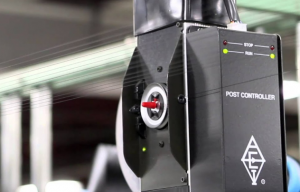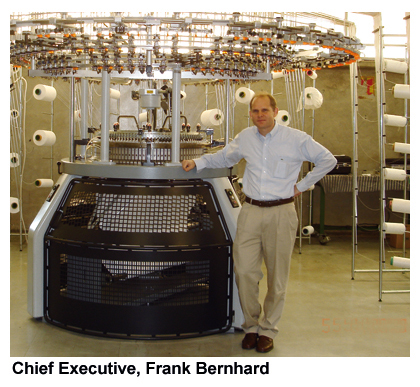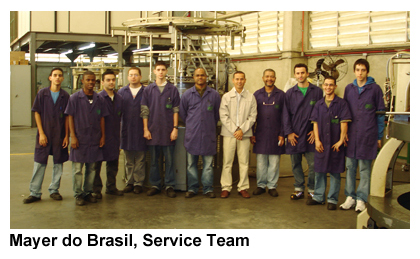
Karl Mayer acquires YTC yarn tensioner technology
Since its foundation in 1958, the Mayer & Cie. Group’s Brazilian subsidiary Mayer do Brasil has played a special role in securing the enormous success enjoyed by MCT of circular knitting machines in Brazil. In a bid to counter the high protective import tariffs imposed at the time, Mayer & Cie. initially founded the Brazilian company as a production base, which started its operations manufacturing feeding devices and other accessories for circular knitting

14th July 2008
Knitting Industry
|
Salto, Brazil
Since its foundation in 1958, the Mayer & Cie. Group’s Brazilian subsidiary Mayer do Brasil has played a special role in securing the enormous success enjoyed by MCT of circular knitting machines in Brazil.
In a bid to counter the high protective import tariffs imposed at the time, Mayer & Cie. initially founded the Brazilian company as a production base, which started its operations manufacturing feeding devices and other accessories for circular knitting machines.
 It then went on between the years 1969 to 1993 to manufacture complete circular knitting machines, including the legendary OVJA 36 – the world’s most successful circular knitting machine of all time. In order to address rising demand, an additional production building with an area of 5,000 m² was completed in 1975. This building is still owned and leased out by Mayer do Brasil today.
It then went on between the years 1969 to 1993 to manufacture complete circular knitting machines, including the legendary OVJA 36 – the world’s most successful circular knitting machine of all time. In order to address rising demand, an additional production building with an area of 5,000 m² was completed in 1975. This building is still owned and leased out by Mayer do Brasil today.
With the opening up of the Brazilian market in 1993, the company discontinued production, and changed its function to a Sales and Service Center for Mayer & Cie. circular knitting machines made in Germany. In 1997, the company relocated to Salto which still today remains the company headquarters. The Center employs a workforce of 40, who provide sales support not only for circular knitting machines but also other Mayer Group products.
Over the years, the company’s sales activities have expanded to include additional agencies such as Karl Mayer, Protechna, Alucolor, Sugiura and EAT, all of which are successfully represented by Mayer do Brasil.
 A team of 15 service technicians is on hand to look after currently around 7000 Mayer & Cie. machines actively producing in Brazil. Chief Executive Frank Bernhard aims to extend the already healthy market share held by MCT, which has traditionally been highly weighted towards single jersey machines, over the coming years.
A team of 15 service technicians is on hand to look after currently around 7000 Mayer & Cie. machines actively producing in Brazil. Chief Executive Frank Bernhard aims to extend the already healthy market share held by MCT, which has traditionally been highly weighted towards single jersey machines, over the coming years.
“The increasing trend towards double jersey and jacquard fabrics is unmistakable. The technical and qualitative edge enjoyed by Mayer & Cie. machines in both mechanical and electronic double jersey sector means that we are ideally placed to increase our market share in Brazil. In this area, we are anticipating double-figure growth rates over a clearly overseeable period”, says Frank Bernhard, successfully at the helm of Mayer do Brasil as CEO since 2001. “Taking on additional agencies will also ensure that we are able to achieve our ambitious growth targets. Our workforce, currently numbering 40, and myself are realistically optimistic about our prospects for the future here in Brazil.”
This optimistic outlook is shared by Management Consultants A.T. Kearney, which considers Brazil to offer the most attractive investment prospects anywhere in the world for the international apparel trade. A recent study performed by the firm shows the Brazilian textile market to be currently growing at an annual rate in excess of 7%, based on an estimated turnover of 37.2 billion US dollars. Brazil is a young market, with over 60% of the population below the age of 29. Consumers here spend an annual average of 402 US dollars on clothes – six times more than the average Chinese consumer.
All these factors would seem to provide the ideal conditions for Mayer do Brasil to enjoy continued success in the world’s most attractive apparel market.

Business intelligence for the fibre, textiles and apparel industries: technologies, innovations, markets, investments, trade policy, sourcing, strategy...
Find out more